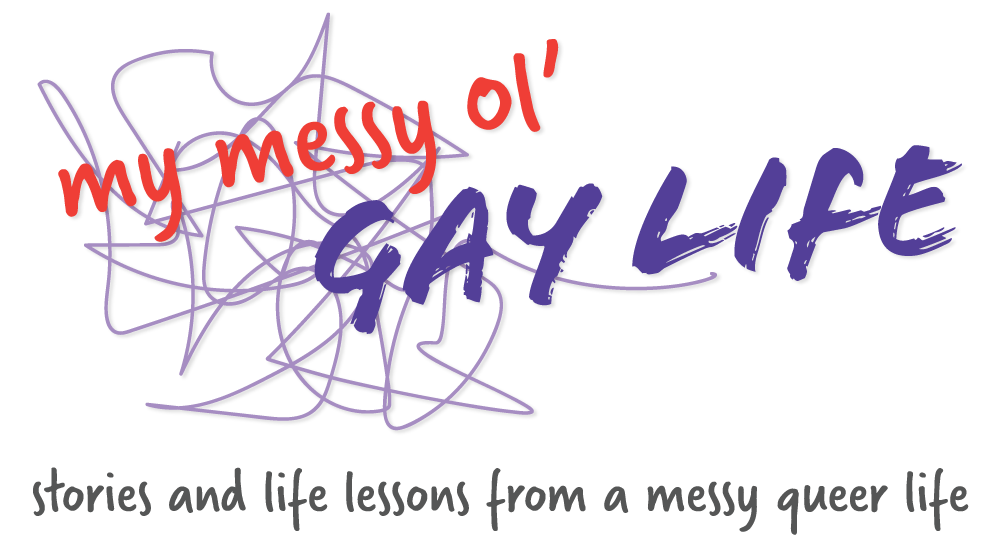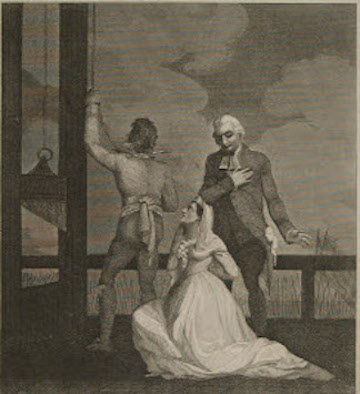Unlike Willy and Sandy, my parents’ friend Brodrick Westcott did not live in the closet because he was yanked out of it. During a routine police raid of the public men’s rooms in a park in St. Louis, he was discovered having man-on-man sex, arrested and thrown in jail under the prevailing sodomy laws. Word of his transgression spread quickly among his peers in the elite West County suburbs and, within a short time, he lost his marriage, his child, his livelihood, his friends, his reputation and eventually his life.
If Mom’s Minnesota friends played the Court Jester and the Eunuch in the royal household, Brodrick was the deposed monarch who took his privileged life for granted until it was suddenly ripped away. Like Marie Antoinette or the Romanovs, he lost everything because he was born at the wrong time.
The term “Tragedy Queen” is often used derisively to describe someone who is unable to get beyond their suffering, but Brodrick was a truly a tragic figure, a man undone by society’s scorn and his own self-loathing.
Whereas Willy and Sandy floated in and out of my 1950s childhood like specters from my mother’s past, Brodrick Westcott was a real-life presence in our suburban home. Also raised in a rich family, Brodrick was good-looking in a patrician way. Tall, thin and fine-featured, he possessed a familiar, preppy veneer. After attending an Ivy League college, he married a well-connected woman from the East Coast and brought her back to St. Louis. They soon had a young son, Brodrick Jr., nicknamed “Broddie.”
Like my parents, Brodrick Sr. had a prodigious drinking problem that was exacerbated by his diminished circumstances after the arrest. After a few cocktails, his convivial chatting devolved into one long crying jag. That was my parents’ cue to shoo me out of the room because an adult conversation was in the wind. Pretending to climb the stairs behind the living room walls, I settled onto a step and pricked up my ears.
Brodrick’s tears flowed unabated as Mom and Dad listened and offered soothing words. But no matter what they said, he sobbed and sobbed.
“Broddie is gone! I have nothing to live for!”
And then they’d have another drink.
After Brodrick passed out, my parents laid him out on the couch, turned him on his side and staggered toward the stairs. I raced up to my room and put my ear to the closed door. When I heard the word “homosexual” as they passed by on the way to their bedroom, it sounded strange, bad and wrong.
After the scandal broke, Brodrick’s wife was granted a swift divorce and she took their son back East for good. Besides being cleaned out financially, Brodrick’s chances of parental visits were nil. Banished from the family business, he tried to hold on to a job selling used cars until he was fired when his drinking and notoriety caught up with him.
He plummeted to the bottom of the bottle and crash-landed in a dilapidated mansion near Gaslight Square. Like Brodrick’s life, the once majestic house was past its glory days. Badly in need of a paint job, its front steps sagged as torn, faded awnings flapped against its cracked windows. Brodrick exhausted his meager savings trying to remodel the house and when alcohol and disgrace overwhelmed his ambitions, he retreated into a few squalid rooms on the first floor.
Most white suburban folks considered the inner city dangerous since its population was mostly African-American. It also provided an enclave for the few pre-Stonewall gay men and women who were brave enough to “live the life.” Sequestered within the city limits, they were out of sight, out of mind, and in Brodrick’s case, out of hope.
Full of self-hate, Brodrick wasn’t searching for a new life, in fact he desperately missed his old one. He was particularly tortured by the loss of his son. The trauma visited him every night like the eagle tearing out Prometheus’ liver, creating a wound that could never heal.

To their credit, my parents showed genuine concern for this notorious “queer.” Mom, who was always concerned with appearances, welcomed Brodrick into our home without hesitation. For all of their unfettered cruelty to each other, my parents sometimes rose to the occasion for others.
Mom made no secret that she preferred Brodrick’s company over the brute that she had married. He was well-educated, cultured and clever right up until the moment that his blood alcohol level spun him into self-pity.
Strangely, Dad held no resentment for Brodrick’s place in my mother’s affections. Although Dad was more macho, he genuinely liked Brodrick and gave him a lot of respect since he had also served as an army officer during World War II.
Besides being fellow veterans, they shared a familiarity with the drunk-tank. When Brodrick called from jail, Dad fished him out immediately, no questions asked and no pay-back expected. He always brought him back to our house to spend the night on the sofa where his keening kept me up until late into the night.
When I descended the stairs in the morning, Carrie, the black lady who lived with us six days a week (that’s another story) was in the kitchen fixing me eggs and bacon before school. From the breakfast table, I could hear Brodrick’s snores thundering from the living room.
“Uh-uh-uh,” she muttered to herself while shoveling the sizzling meat around the cast iron skillet with a spatula. She shook her head and, as usual, kept her thoughts about our household shenanigans to herself, but her surly face said it all.
When I heard the carpool-Mom honking in the driveway, I gathered my books and headed for the front door. Along the way, I stole a glance at Brodrick, a train-wreck of humanity sprawled on the sofa.
Any trace of his former gentility had vanished. His angular face had gone doughy and his once elegant nose had ballooned into a spider-veined, flaky cabbage. His quick washcloth baths and deodorant kept his body minimally clean, but his thick, greasy hair revealed a long put-off shower.
A raggedy overcoat, tweed sport jacket and (strangely) well-polished shoes were strewn around the living room carpet. He lay on his side, his half-buttoned, oxford shirt twisted around his torso, its collar dappled with booze stains commingled with the saliva trailing down the corner of his mouth. The pungent reek of alcohol seeped from his pores, it was a familiar aroma that even the smell of fried bacon couldn’t conceal,
After a few more of these episodes, I became fed up and wanted him out of the house. At barely eleven years-old, I already had two alcoholic adults on my hands and I hardly needed another. Down deep, I knew that I should have more sympathy for Brodrick, but I had used up all my pity-reserves on my mother who was ensnared in her own lonely, troubled life.
No stranger to keeping family secrets, I too had been living a double-life. I told made-up stories about my “normal” home-life to schoolmates, but I rarely had them over. While not understanding exactly what Brodrick’s situation was, I saw first-hand that exposing a shameful secret meant utter annihilation
Brodrick was found slumped over his kitchen table one winter morning in the mid-1960s, dead at fifty-eight from an apparent heart attack (although there were whispers of suicide-by-pills). The heat had been turned off by the gas company, so his body kept well until a neighbor noticed several days’ worth of newspapers piled outside his front door.
His obituary stated that the body was taken to one of the best funeral homes in St. Louis and quickly interred in the Westcott mausoleum with “strictly private family services.” At long last, Brodrick was back in the fold. But forgiveness, if there was any, came too late and is so easy to grant to the dead.
When I heard the news, I felt bad about my unspoken, harsh thoughts toward Brodrick. As time went on, his story turned into a cautionary tale in my adolescent mind. As puberty brought my sexuality to life, any latent queerness lurking beneath my consciousness retreated further into my being and nudged me into my own kid-sized closet.
[Note to readers: Next month’s posts will be more uplifting, but some stories, no matter how sad, need to be told lest they turn to dust within the vaults of the “strictly private.”]


